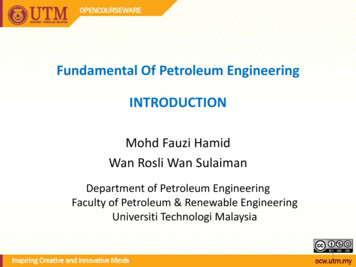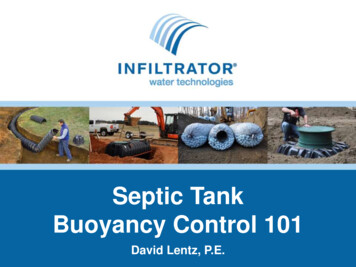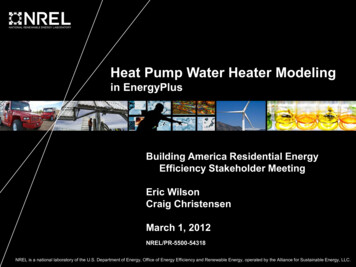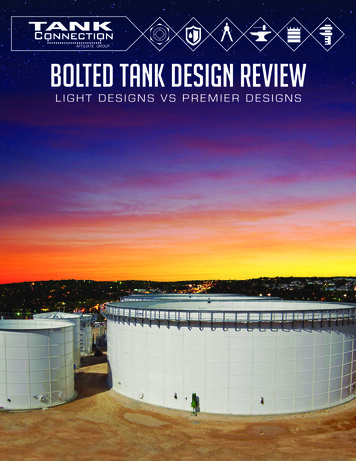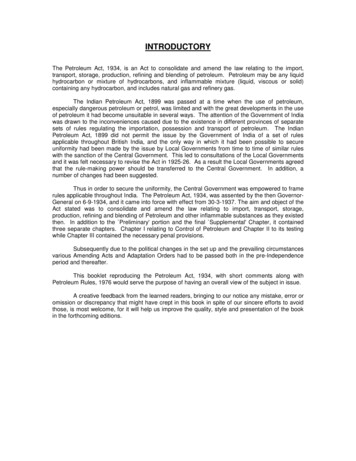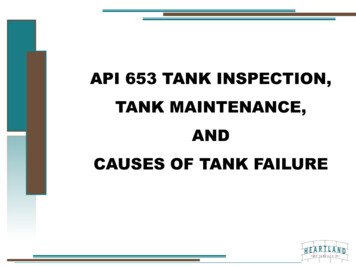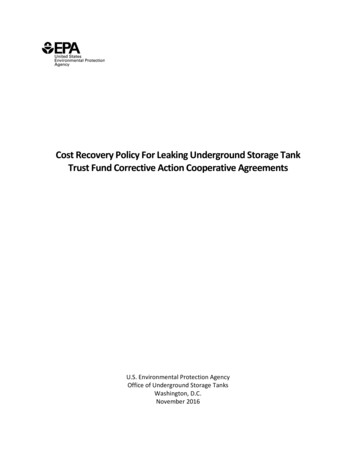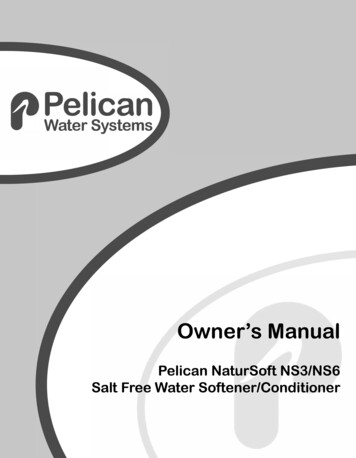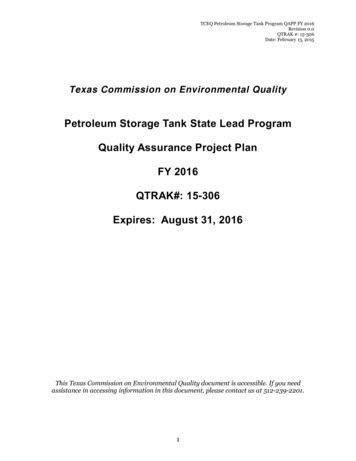
Transcription
TCEQ Petroleum Storage Tank Program QAPP FY 2016Revision 0.0QTRAK #: 15-306Date: February 13, 2015Texas Commission on Environmental QualityPetroleum Storage Tank State Lead ProgramQuality Assurance Project PlanFY 2016QTRAK#: 15-306Expires: August 31, 2016This Texas Commission on Environmental Quality document is accessible. If you needassistance in accessing information in this document, please contact us at 512-239-2201.1
TCEQ Petroleum Storage Tank Program QAPP FY 2016Revision 0.0QTRAK #: 15-306Date: February 13, 2015This page is intentionally left blank.2
TCEQ Petroleum Storage Tank Program QAPP FY 2016Revision 0.0QTRAK #: 15-306Date: February 13, 2015A.0 PROJECT MANAGEMENTThe Texas Commission on Environmental Quality (TCEQ) prepared this PetroleumStorage Tank (PST) State Lead Program Quality Assurance Project Plan (QAPP) as partof the requirements specified in the Leaking Underground Storage Tank (LUST)Corrective Action Grant (grant). At leaking petroleum storage tank (LPST) sites,Contractors perform the data collection activities for the TCEQ. The PST State LeadProgram is implemented by staff within the PST Program. The program developed theContractor Oversight Program presented in Appendix 1.A.1QAPP TITLE AND APPROVALTCEQ PST State Lead Program Quality Assurance Project Plan(QTRAK # 15-306)3
TCEQ Petroleum Storage Tank Program QAPP FY 2016Revision 0.0QTRAK #: 15-306Date: February 13, 2015This page is intentionally left blank.4
TCEQ Petroleum Storage Tank Program QAPP FY 2016Revision 0.0QTRAK #: 15-306Date: February 13, 2015A.1.1QAPP TITLE AND APPROVAL AddendumTCEQ PST State Lead Program Quality Assurance Project Plan(QTRAK # 15-306)5
TCEQ Petroleum Storage Tank Program QAPP FY 2016Revision 0.0QTRAK #: 15-306Date: February 13, 2015This page is intentionally left blank.6
TCEQ Petroleum Storage Tank Program QAPP FY 2016Revision 0.0QTRAK #: 15-306Date: February 13, 2015A.2TABLE OF CONTENTSA.04TPROJECT MANAGEMENT 34T4T4TA.1QAPP TITLE AND APPROVAL 3A.2TABLE OF CONTENTS 7List of Acronyms and Abbreviations 9A.3DISTRIBUTION LIST 11A.3.1U.S. EPA Region 6 Personnel: 11A.3.2TCEQ Remediation Division Personnel: 11A.3.3Monitoring Division (MD) Personnel: 11A.4PROJECT/TASK ORGANIZATION 11A.4.1EPA Region 6 LUST Project Officer 12A.4.2PST/Dry Cleaning Remediation Program Section Manager 12A.4.3TCEQ PST State Lead Program Manager 12A.4.4TCEQ Responsible Party Lead Program Manager 12A.4.5TCEQ LUST Corrective Action Grant Manager 12A.4.6TCEQ PST Lead QAS 13A.4.7TCEQ PST State Lead Project Managers 13A.4.8TCEQ PST Project QA Specialist 14A.4.9TCEQ QA Manager 14A.4.10TCEQ Contractors 14A.4.11Subcontracted or Contracted Laboratory Manager 16A.5PROBLEM DEFINITION/BACKGROUND 18A.6PROJECT TASK DESCRIPTION 18A.7QUALITY OBJECTIVES AND CRITERIA 20A.8SPECIAL TRAINING/CERTIFICATION 40A.9DOCUMENTS AND RECORDS T4T4T4T4T4T4T4T4T4T4T4T4T4T4T4T4T4TDATA GENERATION AND ACQUISITION T4T4T4T4TSAMPLING PROCESS DESIGN (EXPERIMENTAL DESIGN) 45SAMPLING METHODS 45Groundwater Collection Procedures 49Decontamination Procedures 49SAMPLE HANDLING AND CUSTODY 50ANALYTICAL METHODS 51QUALITY CONTROL 52INSTRUMENT/EQUIPMENT TESTING, INSPECTION, AND MAINTENANCE 56INSTRUMENT/EQUIPMENT CALIBRATION AND FREQUENCY 57INSPECTION/ACCEPTANCE OF SUPPLIES AND CONSUMABLES 57NON-DIRECT MEASUREMENTS 57DATA MANAGEMENT T4TASSESSMENTS AND RESPONSE ACTIONS 594T4TC.1C.24T4T4T4T4T4TASSESSMENTS AND RESPONSE ACTIONS 59REPORTS TO MANAGEMENT 604T4T4T7
TCEQ Petroleum Storage Tank Program QAPP FY 2016Revision 0.0QTRAK #: 15-306Date: February 13, 2015D.04TDATA VALIDATION AND USABILITY 624T4T4TD.1DATA REVIEW, VERIFICATION AND VALIDATION 62D.1.1 Data Review by the Laboratory 62D.1.2 Data Usability Review by the Contractor 64D.1.3 Data Review by the PST State Lead Program 64D.2VERIFICATION AND VALIDATION METHODS 65D.3RECONCILIATION WITH USER REQUIREMENTS TABLESTABLE 1. ANALYTICAL METHODS FOR LPST SITE INVESTIGATIONS 24TABLE 2. SW-846 METHOD 8021 METHOD QUANTITATION LIMITS 27TABLE 3. SW-846 METHOD 8021 MEASUREMENT QUALITY OBJECTIVES 27TABLE 4. SW-846 METHOD 8021 CALIBRATION AND QC ACCEPTANCE CRITERIA 28TABLE 5. SW-846 METHOD 8260 METHOD QUANTITATION LIMITS 30TABLE 6. SW-846 METHOD 8260 MEASUREMENT QUALITY OBJECTIVES 31TABLE 7 SW-846 METHOD 8260 CALIBRATION AND QC ACCEPTANCE CRITERIA 34TABLE 8. SW-846 METHOD 8270 METHOD QUANTITATION LIMITS 35TABLE 9. SW-846 METHOD 8270 MEASUREMENT QUALITY OBJECTIVES 37TABLE 10. SW-846 METHOD 8270 CALIBRATION AND QC ACCEPTANCE CRITERIA 39TABLE 11. SAMPLE CONTAINERS, VOLUMES, PRESERVATION, AND HOLDING TIMES 47TABLE 12. FIELD DATA QUALITY REVIEWS 54TABLE 13. LABORATORY DATA QUALITY REVIEWS 55TABLE 14. ENVIRONMENTAL DATA QUALITY REVIEWS 55TABLE 15A. GUIDANCE, FORMS, AND REGULATIONS APPLICABLE TO THE PST SITE ACTIVITIES CONTRACT 79TABLE 15B. GUIDANCE, FORMS AND REGULATIONS APPLICABLE TO THE ENGINEERING SERVICES CONTRACT GURESFIGURE 1. PST STATE LEAD PROGRAM AND RESPONSIBLE PARTY PROGRAM ORGANIZATION CHART 17FIGURE 2. EXAMPLE FIELD CUSTODY FORM 854TUU4T4TUU4TAPPENDICESAPPENDIX 1APPENDIX 2APPENDIX 3APPENDIX 4TCEQ PST/UST CONTRACTOR OVERSIGHT PROGRAMTCEQ GUIDANCE, FORMS, AND RELATED REGULATIONS FOR THE TCEQ PST PROGRAMEXAMPLE SAMPLE CUSTODY FORMEXAMPLE CONTRACTOR LABORATORY ANALYTICAL DATA CERTIFICATION FORMEXAMPLE ORGANIC DATA REVIEW CHECKLIST FOR SOLID/AQUEOUS/VAPOR SAMPLESAPPENDIX 5 DATA FIELDS FOR ELECTRONIC DATA DELIVERABLE4TUU4T4TU4TUU4TU4T4TU4TUU4T8U4T
TCEQ Petroleum Storage Tank Program QAPP FY 2016Revision 0.0QTRAK #: 15-306Date: February 13, 2015A.2.1List of Acronyms and AbbreviationsAcronym ELAPOPPOSHAPAHPCPMPSTPSTRQAQA/QCQAPPMeaningpercent recoveryabsolute valuebenzene, toluene, ethylbenzene, and xylenescorrective action plancorrective action project managercorrective action specialistchemical abstract service registry numberCode of Federal Regulationschemical of concernDry Cleaning Remediation Programdetectability check sampledata quality objectiveGroundwater monitoring reportglobal positioning dataGroundwater monitoring updatelaboratory control samplelaboratory information management systemleaking petroleum storage tanklaboratory review checklistleaking underground storage tankmethod detection limitmilligrammillilitermethod quantitation limitmatrix spikematrix spike duplicatemethyl tert-butyl etherNational Environmental Laboratory Accreditation Programoperating policy and procedureOccupational Safety and Health Administrationpolynuclear aromatic hydrocarbonspersonal computerproject managerpetroleum storage tankpetroleum storage tank remediationquality assurancequality assurance/quality controlquality assurance project plan9
TCEQ Petroleum Storage Tank Program QAPP FY 2016Revision 0.0QTRAK #: 15-306Date: February 13, 2015Acronym TCEQTFTPHTWCugUSEPAUSTVOAVOCxMeaningquality assurance specialistquality controlquality management planresponsible partyrelative percent differencesample detection limitstandard operating proceduressample resultspiked sample resultsemivolatile organic compoundUSEPA Solid Waste Analytical Test ManualTexas Administrative CodeTexas Commission on Environmental Qualitytrust fundtotal petroleum hydrocarbonTexas Water CodemicrogramUnited States Environmental Protection Agencyunderground storage tankvolatile organic analysisvolatile organic compoundmeasured value10
TCEQ Petroleum Storage Tank Program QAPP FY 2016Revision 0.0QTRAK #: 15-306Date: February 13, 2015A.3DISTRIBUTION LISTThe PST Lead Quality Assurance Specialist (QAS) will distribute, in hard copy andaccessible electronic copy, the approved PST State Lead Program Quality AssuranceProject Plan (QAPP), and any amendments or addenda, to the following personnel:A.3.1U.S. EPA Region 6 Personnel:Audray Lincoln, LUST Project OfficerA.3.2TCEQ Remediation Division Personnel:Beth Seaton, Director, Remediation DivisionKenneth Davis, PST/Dry Cleaner Remediation Program (PST/DCRP) SectionManagerDonald Boothby, PST State Lead Program ManagerVictoria Modak, Responsible Party Lead Program ManagerKristine Elliott, LUST Corrective Action Grant ManagerSuzanne Vargas, Manager, Division Support SectionAnn Strahl, PST Lead Program Quality Assurance SpecialistSteven Childress, PST Project Quality Assurance SpecialistMark Maglitto, PST Project Quality Assurance SpecialistA.3.3Monitoring Division (MD) Personnel:Sharon Coleman, TCEQ Quality Assurance (QA) ManagerPenny Sterling, Quality Assurance Specialist, Waste ProgramsThe PST State Lead Program Manager will distribute the approved QAPP, and anyamendments or addenda, to the Contractors performing corrective action work for thePST Program. Contractors will acknowledge receipt of the QAPP to the PST State LeadProgram Manager. The documentation of receipt of the QAPP is maintained by the PSTState Lead Program Manager. The PST State Lead Program Manager will post theaccessible electronic copy of the QAPP on the external Remediation Division web page.A.4PROJECT/TASK ORGANIZATIONThe roles and responsibilities for key individuals responsible for meeting the LUSTCorrective Action Grant commitments and participating in work associated with the PSTState Lead Program are listed below. Figure 1 presents the lines of authority andcommunication for the PST State Lead Program.11
TCEQ Petroleum Storage Tank Program QAPP FY 2016Revision 0.0QTRAK #: 15-306Date: February 13, 2015A.4.1EPA Region 6 LUST Project OfficerThe USEPA LUST Project Officer is responsible for coordinating administrative issuesbetween USEPA Region 6 and TCEQ PST Program, including processing the grant workplans and approving the TCEQ PST Program QAPP.A.4.2PST/Dry Cleaning Remediation Program Section ManagerThe PST/DCRP Section Manager is responsible for managing TCEQ staff performingPST State Lead Program activities and for ensuring environmental activities within thePST State Lead Program are performed in accordance with applicable plans andprocedures, work performance is measured against specifications, and appropriatemanagement oversight and inspection is accomplished. The PST/DCRP SectionManager, or designee, assesses competency of contractors via an established contractorevaluation process and assesses competency of PST State Lead Program staff via anestablished performance review process.A.4.3TCEQ PST State Lead Program ManagerThe TCEQ PST State Lead Program Manager is responsible for: Managing all aspects of the PST State Lead Program activities performed by theRemediation Division and its Contractors;Communicating PST State Lead Program requirements to the PST Contractors,including distributing the approved PST QAPP to the Contractors andoverseeing/managing contract budgets;Implementing the PST State Lead Program quality assurance activities associatedwith site investigations or corrective actions; andMonitors the competency of contractors.A.4.4TCEQ Responsible Party Lead Program ManagerThe Responsible Party (RP) Program Manager is responsible for implementing the PSTRP Lead Program activities and associated investigation and corrective action activitiesand for performing queries of the PST database to generate reports for the public, local,state, and federal entities.A.4.5TCEQ LUST Corrective Action Grant ManagerThe LUST Corrective Action Grant Manager is responsible for: Coordinating with USEPA Region 6 regarding TCEQ LUST Corrective ActionGrant administrative issues, including processing the LUST Corrective ActionGrant Work Plan;12
TCEQ Petroleum Storage Tank Program QAPP FY 2016Revision 0.0QTRAK #: 15-306Date: February 13, 2015 Monitoring the LUST Corrective Action activities for compliance with the PSTProgram QAPP;Providing the PST Lead QAS with dates of scheduled field sample collectionactivities at LUST-funded sites to assist the QAS in planning audits; andProviding the PST Project QAS with one or more analytical data package fromLUST-funded site activities during the fiscal year to assist the Project QAS inperforming audits of data quality. The TCEQ LUST Corrective Action GrantManager will provide the data package to the QAS no later than the midpoint ofeach quarter of the fiscal year during which an audit of data quality is scheduled.Reviewing the PST Program QAPP; andAssisting in the resolution of internal and external audit findings related to theLUST Corrective Action Program activities and performance.A.4.6TCEQ PST Lead QASThe PST State Lead Program QAS is responsible for quality assurance (QA) functionsincluding the following: Preparing and maintaining the PST State Lead Program QAPP and other QAdocuments, e.g., annual PST QA report, related to LUST site activities;Providing training to the PST program staff and Contractors on the PST programQA specifications and requirements;Coordinating between the PST program staff and other internal/external entities(e.g., other TCEQ staff, other agencies, or Contractors) regarding QAspecifications and requirements;Assisting the PST Program to establish specific data quality objectives (DQOs) forLPST site activities when the objectives are not specified by TCEQ and/or USEPApolicy;Assessing the PST Program conformance to the agency quality management plan(QMP) and the program quality system requirements;Planning and conducting assessments and audits of environmental samplingactivities funded by the LUST grant;Verifies the evaluation of competency of contractors and PST State Lead Programstaff is performed and documented; andPrescribing corrective action, as needed, when DQOs are not met.A.4.7TCEQ PST State Lead Project ManagersThe PST State Lead Project Manager (PM) is responsible for coordinating, overseeing,and managing LPST site field investigations and PST corrective action in accordancewith operating procedures and the PST QAPP including:13
TCEQ Petroleum Storage Tank Program QAPP FY 2016Revision 0.0QTRAK #: 15-306Date: February 13, 2015 Reporting to the respective management any deviation from accepted fieldprocedures and DQOs;Ensuring proper documentation of sampling, sample preservation, sampledelivery and field analytical procedures;Enacting appropriate custody procedures;Overseeing Contractor-performed activities to monitor performance forcompliance with operating procedures and QA requirements;Reviewing and evaluating PST site data; andEvaluating contractor competency via an established contractor evaluationprocess and maintaining documentation of competency in accordance with theapplicable PST contract specifications.A.4.8TCEQ PST Project QA SpecialistThe PST Project QA Specialist serves as a resource on analytical chemistry and QA/QCissues. The responsibilities of the project QAS include: reviewing of the QAPP and associated project documents;providing technical assistance to resolve QA/QC or analytical chemistry issues;assisting in the review of data packages and QC summaries at the request of theTCEQ PM; andassisting the TCEQ PM in problem resolutions and monitoring corrective actions.Problems discovered during a review by the QAS will be reported to the TCEQ PM. Theproject QAS is available to assist the TCEQ PM in the resolution of problems andcorrective actions.A.4.9TCEQ QA ManagerThe QA Manager is responsible for: Developing, updating, approving, and implementing the agency QA program,QMP, and QA procedures;Monitoring development and implementation of QAPPs and corrective actionsplans;Conducting quality systems audits and conducting or participating in other typesof assessments as appropriate; andProviding assistance in the area of QA.A.4.10TCEQ ContractorsThe TCEQ PST State Lead Contractors performing work for the PST State Lead Programare responsible for:14
TCEQ Petroleum Storage Tank Program QAPP FY 2016Revision 0.0QTRAK #: 15-306Date: February 13, 2015 Assuring field equipment is properly maintained and calibrated and theindividuals operating the equipment are adequately trained;Recording field activities, including field measurements, pertinent fieldobservations, and labeling, handling, storage and shipping activities to documentproject requirements are met;Complying with custody procedures;Notifying the TCEQ PM of circumstances having the potential to adversely affectthe quality of data generated during, or derived from, LPST field activities;Collecting global positioning data as requested by the TCEQ;Preparing and maintaining a health and safety plan for each field event;Assisting the TCEQ PM in establishing and meeting the DQOs for the site;Implementing necessary corrective action;Informing their staff of the project DQOs, and for adhering to the required dataacquisition procedures and documentation requirements; andDocumenting the competency of their personnel and all subcontracted parties,maintaining the documentation during the active and archived life of the project,and making the documentation available to the TCEQ for review.The Contractors are responsible for the quality of the data generated for the project andfor reporting to the PST State Lead Program PM any data quality problems or problemsencountered by the laboratory during the analysis of the project samples. Regardingproject data, the contractor is responsible for: Reviewing the analytical data generated from sampling events to verify the dataare of known and documented quality and to determine the usability of any dataqualified by the laboratory or the data reviewer; andCompleting the Contractor Laboratory Analytical Data Certification Form inAppendix 4 to certify:o the analytical data have been reviewed and evaluated for technicalacceptability, including problems and anomalies associated with the data;o a determination has been made regarding the usability of the analytical datarelative to the project objectives; ando at the time of data generation, the laboratory was accredited under the TexasLaboratory Accreditation Program for the matrices, methods, and parametersof analysis, unless an exception allowed under 30 Texas Administrative CodeSubchapter 25.6 is approved in writing by TCEQ .The contractor is responsible for preparing a data review summary as described inElement A.9.15
TCEQ Petroleum Storage Tank Program QAPP FY 2016Revision 0.0QTRAK #: 15-306Date: February 13, 2015A.4.11Subcontracted or Contracted Laboratory ManagerThe manager of a laboratory performing chemical analyses for the PST Program isresponsible for: Managing calibration activities and laboratory quality control (QC) performancewhen generating analytical data under this QAPP;Verifying laboratory analyses and data processing conform to the most currentstandards adopted by the National Environmental Laboratory AccreditationProgram (NELAP) and requirements of 30 Texas Administrative Code Chapter 25;Implementing and maintaining a documented QA program; andIdentifying and documenting anomalous and/or outlying analytical results in thedata package via the laboratory case narrative or the laboratory review checklist(LRC).16
TCEQ Petroleum Storage Tank Program QAPP FY 2016Revision 0.0QTRAK #: 15-306Date: February 13, 2015Audray LincolnLUST Project OfficerEPA Region 6241-665-2239Sharon ColemanTCEQ QA Manager512-239-6340Kristine ElliottLUST Grant ManagerTCEQ512-239-4665Steve ChildressMark MaglittoPST Project QA Specialist512-239-2440512-239-3153Ann Strahl, PST LeadProgram QA Specialist512-239-2500Victoria ModakRP Lead Program ManagerTCEQ512-239-5695Donald BoothbyPST State Lead ProgramManager, TCEQ512-239-2485PST RP LeadProject ManagerPST State LeadProject ManagerResponsible PartyContractorsContractorsLaboratory ManagerLaboratoryLaboratory ManagerLaboratoryLines of AuthorityLines of CommunicationFigure 1. PST State Lead Program and Responsible Party ProgramOrganization Chart17
TCEQ Petroleum Storage Tank Program QAPP FY 2016Revision 0.0QTRAK #: 15-306Date: February 13, 2015A.5PROBLEM DEFINITION/BACKGROUNDPetroleum storage tanks (PSTs) have the potential to release the contents of the tankinto the environment, and leaks associated with PSTs have been a major cause ofgroundwater contamination. In October of 1986, Congress amended Subtitle I of theResource Conservation and Recovery Act (RCRA) to create the LUST Trust Fund (TF) tofinance corrective action measures at LPST sites where the owner or operator for theLPST is unknown, unwilling, or financially unable. Federal grant funding of the LUSTTF is made available through 40 CFR Part 31. Through a cooperative agreement with theUSEPA, the TCEQ is responsible for administrating these funds for LUST - fundedactivities in Texas.4T4TThe LUST activities under the PST Program include: administering the allocated fund,inspecting facilities reported to have an existing or suspected leak from one ormore underground storage tank,investigating LPST facilities,remediating LPST incidents,protecting human health and the environment, andresponding to emergencies caused by an LPST.This QAPP is implemented at LPST sites when LUST funds are used for inspections,investigations, corrective actions, cleanups and GPS data collection at LPST sites andwhen the Remediation Division PST/DCRP Section conducts activities at LPST sites noteligible for LUST funds.A.6PROJECT TASK DESCRIPTIONThe PST State - Lead Program conducts data collection activities associated with thecorrective action, including investigation and remediation, at LPST sites using LUSTfunds. The PST State Lead Program also provides technical assistance and outreach andeducation programs for the regulated community.Each facility that has USTs or above ground storage tanks registered with the TCEQ isunique depending on its components, type of products stored, local hydrogeologicconditions, and history of releases. In addition, these PST facilities are located invirtually every type of Texas community ranging from rural to metropolitan. At anyTexas facility where a leak from a PST has occurred, the staff of the TCEQ PST Programis responsible for ensuring all site activities are performed in accordance with acceptedQA procedures.18
TCEQ Petroleum Storage Tank Program QAPP FY 2016Revision 0.0QTRAK #: 15-306Date: February 13, 2015This PST QAPP describes the TCEQ QA plan for Texas LPST site activities. PotentialLPST site activities pursued by, for, or under contract to the TCEQ include thefollowing: Immediate response measures required to abate or mitigate the effects to humanhealth and/or the environment of petroleum releases from PSTs;Testing of PST systems;Conducting site contamination assessment studies to determine the source(s), andestimate the extent and magnitude, of contamination;Remedial action feasibility studies;Environmental and human health risk assessments;Remedial action;Disposal of investigative-derived waste and remediation-generated waste;Provision of drinking water to affected individuals; andTemporary or permanent relocation of affected individuals.Specific LPST site activities will generate environmental data. These activities includesoil and water sample collection and analysis; soil boring; monitoring well installation;decontamination procedures; groundwater level; geophysical and other surveymeasurements; and data reduction and analyses. These activities, and all otherpertinent LPST site activities that generate environmental data, are subject to QAPPrequirements. Potential uses for collected environmental data include sourcedetermination, estimation of the magnitude and extent of contamination, determinationof the nature of contamination, characterization of site conditions for development ofremedial action procedures, and documentation of the effectiveness of remediation.Petroleum-contaminated waste may not be transported from the generating site unlessthe waste has been characterized and a waste manifest is initiated. Samples collected tocharacterize the waste should be analyzed for the major components of petroleum,including benzene, toluene, ethyl benzene, and xylene (BTEX), total petroleumhydrocarbons (TPH), and any other contaminants indicated by specific conditions at thegenerating site. A TCEQ petroleum-substance waste manifest is initiated by thegenerator and is to include the information indicated on the back of the form. The wastemanifest used to transport petroleum contaminated material must conform toapplicable statutes and requirements.The primary goal of the QA program outlined in this QAPP is to ensure the datagenerated by or for the TCEQ relating to LPST site activities are scientifically valid,legally defensible and of known and documented quality. Specific objectives of the QAprocedures include the following: Data generated for or by the TCEQ PST Program will be of known anddocumented quality;19
TCEQ Petroleum Storage Tank Program QAPP FY 2016Revision 0.0QTRAK #: 15-306Date: February 13, 2015 The intended use of data will be determined before data collection efforts begin toensure the necessary level of data quality is attainable;Data produced by or for the TCEQ will be of known and acceptable precision,accuracy, representativeness, completeness, and comparability;The LPST projects will receive adequate supervision by the staff of the PSTprogram to ensure adherence to applicable QA procedures; andThe PST State Lead PM will have overall responsibility for the implementation ofQA procedures related to sites managed within the PST program.Data quality procedures for certain activities commonly required at LPST sites (e.g.,groundwater and soil sampling and analysis) have been identified and the specific DQOsare detailed in Element A.7 of this QAPP. For specialized activities which are required atLPST sites, specific QA procedures and DQOs will be identified during development ofthe plans for site activities. The procedures required for the development of site and/oractivity specific QA procedures and DQOs are also identified in Element A.7.The PST State Lead Program will provide information on LPST program QArequirements to the regulated community, other State of Texas agencies, and privateentities participating in the LPST program. Those participants who will be involved inthe generation of environmental data for LPST site projects will be committed to useprocedures identified in this QAPP. This QAPP will also be made available to allpotenti
A.4.4 TCEQ Responsible Party Lead Program Manager . The Responsible Party (RP) Program Manager is responsible for implementing the PST RP Lead Program activities and associated investigation and corrective action activities and for performing queries of the PST database to generate reports for the public, local, state, and federal entities.



